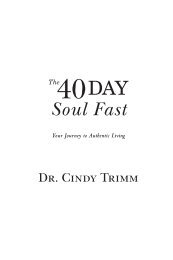Battle for the Mind:How You Can Think the ... - Destiny Image
Battle for the Mind:How You Can Think the ... - Destiny Image
Battle for the Mind:How You Can Think the ... - Destiny Image
You also want an ePaper? Increase the reach of your titles
YUMPU automatically turns print PDFs into web optimized ePapers that Google loves.
26 <strong>Battle</strong> <strong>for</strong> <strong>the</strong> <strong>Mind</strong><br />
well. The more thoroughly it is treated, <strong>the</strong> more precious it<br />
becomes, and <strong>the</strong> better it tastes. 5<br />
Be<strong>for</strong>e moving on, we want to compare <strong>the</strong> Book of Romans to <strong>the</strong><br />
Four Gospels—Mat<strong>the</strong>w, Mark, Luke, and John. The four Gospels are<br />
historical books (describing Christ’s unique birth, His unique teaching,<br />
and His unique life) with deep spiritual undertones. The Gospels present<br />
<strong>the</strong> man Jesus and <strong>the</strong> message that He brought from His Fa<strong>the</strong>r to be<br />
relayed to <strong>the</strong> world. We learn much about God through <strong>the</strong> way Jesus<br />
interacted with <strong>the</strong> religious world and <strong>the</strong> way He intermingled with<br />
<strong>the</strong> common people. The four Gospels establish Christianity as more<br />
than a religion—more than simply a rule of life. Jesus came to establish<br />
a relationship with <strong>the</strong> human race. It is in <strong>the</strong> Gospels that we discover<br />
<strong>the</strong> “<strong>the</strong>o-anthropicness” of Christ—His Deity and His humanity. It is in<br />
<strong>the</strong> Gospels that people meet God face-to-face. The One who lived in<br />
<strong>the</strong> face of God now comes to exegete (explain) God to people. It is in<br />
<strong>the</strong> person of Christ and through His humanity that we are led into a<br />
divine experience where we encounter God. And it is in <strong>the</strong> historical/<br />
geographical presentation of Christ by <strong>the</strong> four Gospel writers that <strong>the</strong><br />
greatest difference between Christianity and any o<strong>the</strong>r religion in <strong>the</strong><br />
world is established.<br />
As we analyze and contrast <strong>the</strong> four Gospels to <strong>the</strong> Book of Romans,<br />
we find that <strong>the</strong> historical and geographical accounts of <strong>the</strong>se Gospels<br />
bring us into <strong>the</strong> person of Jesus Christ by whom we gain our salvation.<br />
In <strong>the</strong> Gospels we meet Jesus, we hear His words, and we watch His<br />
actions. In <strong>the</strong> end, we see Him dying on a cross and <strong>the</strong>n, with great joy,<br />
we read of <strong>the</strong> resurrection. In <strong>the</strong> Gospels, we see what He did, but it<br />
is in <strong>the</strong> Book of Romans that we come to understand <strong>the</strong> implications<br />
of what He did. In <strong>the</strong> Book of Romans, we ascend <strong>the</strong> high mountains<br />
of spiritual revelation and begin to see <strong>the</strong> significance of justification,<br />
propitiation, reconciliation, redemption, sanctification, and adoption. If<br />
we read only <strong>the</strong> four Gospels, we will never come to understand <strong>the</strong><br />
spiritual significance of those actions. That is why <strong>the</strong> Book of Romans<br />
is considered to be <strong>the</strong> Fifth Gospel, <strong>for</strong> without it, <strong>the</strong> story of Jesus is<br />
simply ano<strong>the</strong>r story; but with <strong>the</strong> Book of Romans, <strong>the</strong> glorious light of




